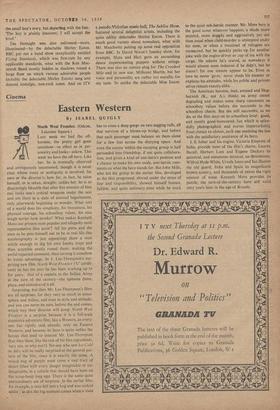Cinema
Eastern Western
By ISABEL QUIGLY
LAST week we had the off- heroine, the pretty girl gone somehow—in effect as in per- sonality and looks—askew. This week we have the off-hero. Like her, he is ironically observed and ambiguously intentioned, though it is never clear whose irony or ambiguity is involved, his own or the director's; how far, in fact, he takes himself, or is taken, straight; unlike her, he is so disarmingly likeable that after five minutes of him one tucks one's critical weapons under the scat and sits there in a state of amused beguilement, only afterwards beginning to wonder. What sort of a world does his simplicity, his breeziness, his physical courage, his schoolboy values, his nice tough terrier look invoke? What makes Kenneth More our present most popular and allegedly most representative film actor? All his parts and the man as he puts himself out to be in real life (his autobiography is just appearing) show a man subtle enough to dig his own booby traps and then scramble neatly round them; making the awful expected comment, than turning it somehow to ironic advantage. In J. Lee-Thompson's sur- prising new film, North West Frontier ('U' certifi- cate) he has the part he has been working up to for years : that of a captain in the Indian Army at the turn of the century—the epitome (time, place, and attitudes) of it all.
Surprising; but then Mr. Lee-Thompson's films are all surprises, for they vary so much in atmo- sphere and milieu, and even in style and attitude; and you can never be sure, before the end comes, which way their director will jump. North West Frontier is a surprise because it is a full-scale expensive adventure film, like a Western, as every- one has rightly said already, only an Eastern Western; and because its hero is quite unlike the heroes that tend to interest Mr. Lee-Thompson (but then these, like the rest of his film ingredients, vary too, so why not?). No one who saw Ice Cold in Alex will be really surprised at the general pat- tern of the film, since it is exactly the same. A mixed bag of people must cross a vast tract of desert filled with every danger imaginable or un- imaginable, in a vehicle that should have been on the scrap-heap long ago. There is the same quite extraordinary use of suspense. In the earlier film, for example, a man fell into a bog and was sucked under : in this the big moment comes when a train
has to cross a deep gorge on two sagging rails, all that survives of a blown-up bridge, and before that each passenger must balance on them alone for a few feet across the dizzying space. And even the enemy within the escaping group is half persuaded into friendship, if not quite collabora- tion, and given a kind of anti-hero's position and a chance to make his own snide, anti-heroic com- ments on what the hero stands for. But John Mills, who led the group in the earlier film, developed as the film progressed, altered under the stress of fear and responsibility, showed himself human, fallible, and quite unbrcezy even while he stuck to the quiet sub-heroic manner. Mr. More here is the good scout whatever happens, a shade more puzzled, more doggily and aggressively put out than usual when child-murder is attempted under his nose, or when a trainload of refugees are massacred, but he quickly perks up for another joke with the engine-driver or cup of tea with the cargo. He admits he's scared, as nowadays it would almost seem indecent if he didn't, but he doesn't for one minute appear to be. Even in love he never 'gives,' never sheds his manner or explains his attitudes, while his public and private selves remain exactly alike.
The American heroine, lean, amused and Hep- burnish (K., not A.), thinks an army career degrading and makes some sharp comments on schoolboy values before she succumbs to the schoolboy charm. But she still succumbs, as we do, so the film stays on its schoolboy level : good, and mostly good-humoured, fun which is splen- didly photographed, and moves imperturbably from climax to climax, each one outdoing the last with the satisfactory assurance of its hero.
I. S. Johar and his engine, Victoria Empress of India, provide most of the film's charm; Lauren Bacall, Herbert Lom and Eugene Deckers its quizzical, and sometimes inimical, un-Britishness; Wilfrid Hyde-White, Ursula Jeans and Ian Hunter the old guard; India and Spain its magnificent brown scenery, and thousands of extras the right amount of noise. Kenneth More provides its puzzle, the turn-of-the-century hero still valid sixty years later in the age of Brando.






































 Previous page
Previous page